Hmm. Purr. Vroom. Modern engineering has made driving a car easier on the ears than ever.
But there are some car noises you don’t want to hear, because they can signal trouble. Every once in a while, roll down the windows and start listening for “any sound that is odd,” says Mike Peth, director of technical training at Ohio Technical College in Cleveland. “You know your car, so you can often pick up something that may become a problem.”
These seven car noises might be warning signs of trouble:
- A sound like a coin in a clothes dryer.
- Brakes squealing, grinding or growling
- A finger-snapping, popping or clicking sound when you turn
- A rhythmic squeak that speeds up as you accelerate
- A howling, whining or even “singing”
- Rhythmic clunking, tapping or banging from under the hood.
- Squealing under the hood at start-up or when accelerating.
1. A sound like a coin in a clothes dryer
What it means: If you hear something rattling around inside a wheel at low speeds (and then stops as you drive faster) it could be a loose lug nut inside a hub cap. That might mean your wheel wasn’t tightened properly the last time it was removed and replaced. Take your car to a mechanic ASAP.
2. Brakes squealing, grinding or growling
What it means: If you hear a squealing noise, your brake pads or shoes might be nearing the end of their service life and must be replaced. If they grind or growl, get your brakes checked out immediately. It could be a sign that pads are so worn that metal is touching metal—a serious problem that could affect braking efficiency. (Check out these 5 signs you need new brake pads.)
3. A finger-snapping, popping or clicking sound when you turn
What it means: If you have a front-wheel-drive or all-wheel drive vehicle and hear this sound when you turn or corner (but the noise stops when you steer straight) one or both of the constant velocity (CV) joints on your front axle could need replacing.
4. A rhythmic squeak that speeds up as you accelerate
What it means: If you have rear-wheel or four-wheel drive and hear this sound, the culprit could be the universal joint (U-joint), which are found in pairs and are components of the driveshaft. Get it checked by a mechanic immediately.
5. A howling, whining or even “singing”
What it means: This is usually a sign that your bearings—tiny metal balls that help parts rotate smoothly—aren’t doing their job. But which ones? If you have front-wheel drive, and the sound changes as you turn left, right and back again, it’s likely your front-wheel bearings; a gradually growing, steady howl signals rear-wheel bearings. If you have rear-wheel drive and the whine gets louder as you accelerate, your differential, which allows your wheels to spin at different rates when needed, could be leaking fluid. Get it fixed immediately.
6. Rhythmic clunking, tapping or banging from under the hood
What it means: There could be a serious problem with valves, connecting rods or pistons. Get to a mechanic ASAP.
7. Squealing under the hood at start-up or when accelerating
What it means: This could come from worn or loose accessory belts that drive things like your power steering pump, air conditioner compressor and alternator. With newer cars, it may point to the serpentine belt, which drives multiple accessories at once, and is relatively easy and cheap to fix.
If you’re ever stranded on the road, having Emergency Roadside Service (ERS) could get you out of trouble ASAP. (It’s available through your GEICO Mobile app!) Add ERS to your policy for just pennies per day per vehicle.
By Ira Hellman
Next article: 5 Signs You Need New Tires

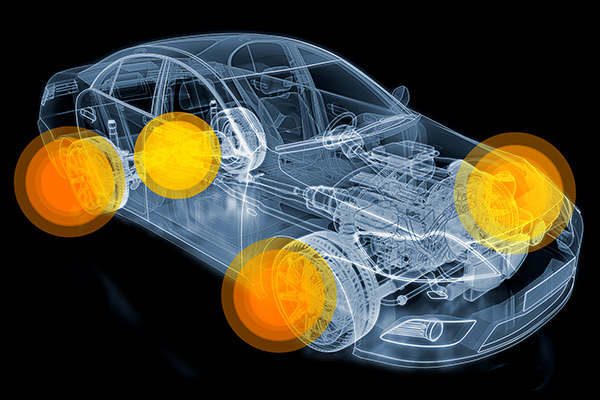


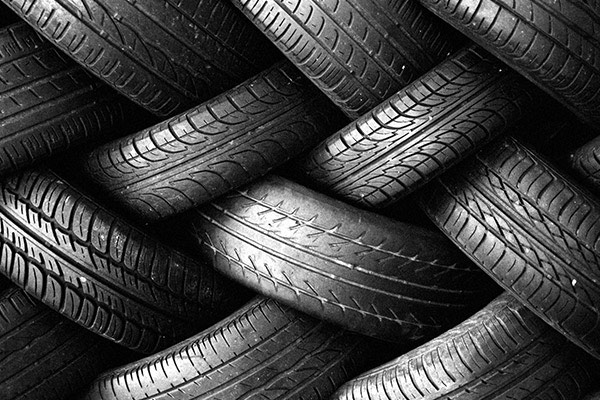
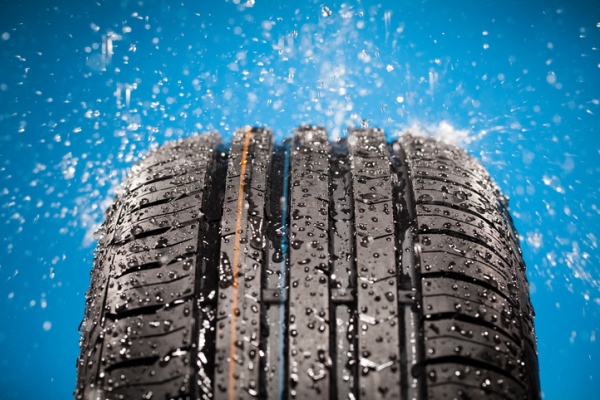
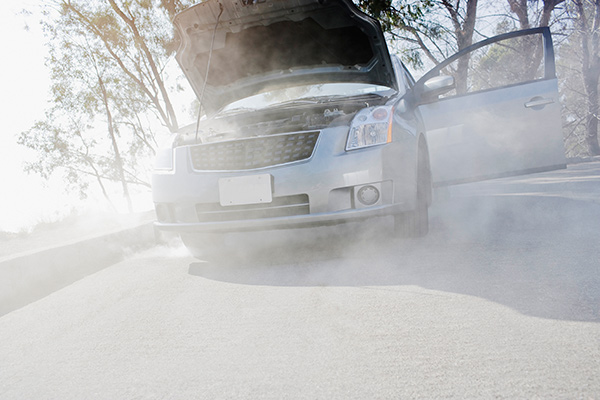
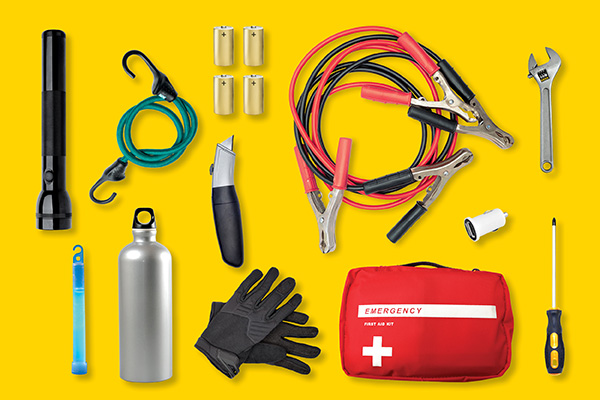

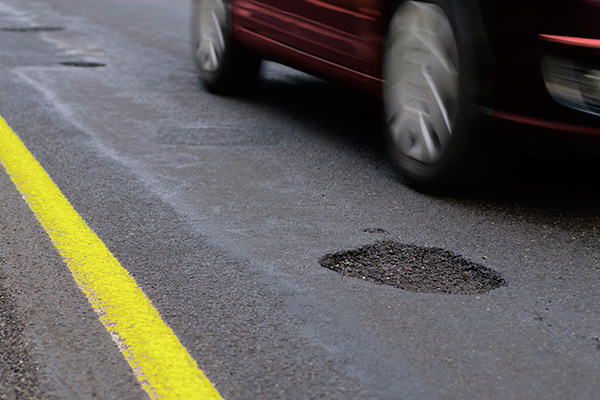
Lin Wilson says,
Thanks for the tips!
The key to identifying “odd” sounds in your car is, of course, to hear them in the first place. Most of us crank up the music as soon as we get into the vehicle. I have to force myself to drive in silence for a while to “listen” to the car.
A GEICO customer for more than 20 years.
Robert Balino says,
I hear squelling sounds when backing up my 2013 Chrysler 200 . Was told its my brakes being rusty. True?
Prentice E. Curtis says,
I haven’t heard any of the noises you have pointed out, but I have had something like the car is about to stop and when you put your feet on the gas, it jerk ahead. The Mechanic, that looked at it didn’t feel what I did and said nothing was wrong. The brake pedal felt like grabble was in the brakes when you put on brakes. Is there something wrong, the mechanic said no.
Francine says,
First let me say thank you for this information. Question : if you hear a hollow clanging in the muffler of and on , is that the heat shield and does it need to be removed or should it be replaced ? Or what could it be.
Angela Dove says,
Thanks for the info appreciate you taking the time out to educate people on this important imformation. Will take heed to what I learned.
Josefina Uribe Juarez says,
Thanks for this information, it is really helpful to learn about preventive measurements mostly for women
Sal says,
And todays young men too Josefina, i noticed not many them know much.
Joe Casey says,
Good info. I do listen to car noises & have for a long time. I’m afraid the most recent noise I’ve heard matches one that you pointed out.
Thanks for this article.
Nicolas Guzman says,
Good to know thanks ??
ProfQuill says,
It’s great advice to pay attention to sounds different from what you are used to. I’ve found this applies to anything mechanical, not just cars. If it’s a different sound, chances are something’s not working as designed, the issue may be trivial like something foreign rattling around, or a serious part about to break.
Just a few examples, my older car (which I’ve since replaced) was starting to have a certain roughness upon accelerating when starting out, which would slowly subside. I checked everything I thought was relevant, and at an inspection a knowledgeable mechanic said my MOTOR MOUNTS were worn. So the engine would vibrate more than usual.
That was actually a pretty easy and cheap fix as these things go.
A WAY long time ago, I had a car that would set up quite a clatter upon certain ranges of acceleration. Really loud and disconcerting, obviously worried something serious is coming off the rails. And of course near impossible to simulate standing still.
FINALLY found that a metal tag spot-welded to the catalytic converter came loose on one end and this tag thing would set up a vibration at certain RPM hitting both the converter and the shield, causing this noise. Of course, not visible because it’s behind the shield. Solution, just pull it off and she quieted right down.
Then there was my washing machine but Geico doesn’t insure that ;-).
Marcia McNeil says,
Thank you GEICO,
This information is so helpful. As a female driver, I usually am not aware of certain sounds coming from my vehicle. This information will help me to get familiar and to pay even more closer attention, should one of the seven car noises take place while driving.
Thanks again.
Melinda Acaac says,
Thank you, that was very interesting and good information !!! I should be mindful of those noises in my car. Melinda Acaac
Mattie Smith says,
This information is very helpful, as I’m constantly listening for unusual noises. I’m going to try and print this out, for future references. Thank you!
Jenny Ramirez says,
Thank you for the information, is good to know.
Deborah A Rone says,
Greetings Geico,
I am so grateful for this information. Geico has been a true blessing to me for I have never had anyone of my friends to tell me that their insurance carrier supplies them with information of this magnitude. I just printed this document and will be placing it in my glove box when I go to the store today. Kudos Geico !!
bob cooke says,
I have a Toyota Camry 2004 with less than 100,000 miles. When the engine is cold, as in winter, there is a rattling noise under the hood until the motor warms up. Now in spring it
does it and I fear it’s getting worse because of that. My mechanic for many years has checked
the drive chain, the lifters and listened to the exhaust manifold but can’t understand what is wrong. Would you have an idea of the problem? Thank you
ProfQuill says,
Of course, if a mechanic has already checked it out, I’d hardly want to second-guess it, but as I posted my own experience, worn engine mounts can cause the engine to wobble around more than usual, causing rattle-type noises.
In my case, it was worse when the engine was cold and lessened as things warmed up, not so sure why that was the case other than the motor smoothing out as it warmed, lessening the movement. And it will slowly get worse over time.
Check it out by taking a crowbar or a piece of wood and prying away at the engine (while not running), it should remain in place with only minor movement.
What is a motor (or engine) mount? A piece of steel and rubber that the engine rests on in the engine bay, there would be 2 or 3 of them. Over time, the rubber can develop a crack, or just wear away from the vibration, allowing the engine to move too much.
Replacing them doesn’t HAVE to be a big job, not like you have to remove the engine or anything (although your car will vary), and these things aren’t overly expensive. How difficult again varies, but I did all 3 in my Saturn a while ago with parts gotten online.
Vernessa Johnson says,
I learned from my father as a young person. To listen for sounds. Whenever he drove and heard something, he would ask did we hear that. It’s always been my detection for years.